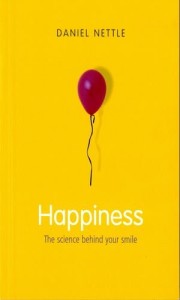 This article was originally published a few years ago at the RockStar Success Library. And who doesn’t want to be happy?
This article was originally published a few years ago at the RockStar Success Library. And who doesn’t want to be happy?
It makes sense that if the world’s philosophies and religions have been examining happiness for the past few millennia, it’s fair game for the psychologists and neuroscientists to take a whack at it. It seems a little ironic to take a “scientific” look at happiness, considering how subjective the idea of happiness really is, but Daniel Nettle does a great job looking at the psychology of what happiness is and what causes it. In the end, an examination of happiness is really a way of examining what motivates us as human beings.
Questions, Ideas, and Implications:
- Daniel points out on the first page that the Declaration of Independence declares one of our unalienable rights is not happiness, but rather the pursuit of happiness. Is the attitude of entitlement that we seem to have, the attitude that we deserve to be happy, out of whack? Are we more unhappy because we think we are supposed to be happy and our expectations don’t match reality, thus causing more frustration and anxiety?
- A powerful idea I took from this was that the wanting of something is different than the liking of something. It makes me give pause to some of my wants, because I know the feeling of wanting something, getting it, and then not really enjoying it.
- There seems to be evidence that making a lot of money doesn’t have a direct causal relationship with being happier. Have you really thought about that? How much do you worry about money – and why do you? I think this reinforces the ideas that although poverty doesn’t bring happiness, having a million dollars in the bank doesn’t either.
- Daniel looks a lot at the physiological systems that seem to be evolutionarily driven. He looks at the biological reasons why our happiness system works. I think that he stretches some of these comparisons, but it does bring up a good question. What happens when millions of years of evolution favor/create a certain response pattern, and then the environment changes? I would suggest that the environment that the average human lives in now is significantly different than the one we lived in even ten thousand years ago. We don’t have to be worried about getting eaten by tigers that often. Some of “wiring” might be a incongruous with our new environment.
Should you read this book?
Sure. I don’t think you have to drop everything you are doing and go get it, but it is interesting. If you spend a lot of time being really happy already, I don’t think this is going to help you much. If you struggle with unhappiness, and keep wanting to be more happy, this will give you a great starting point to describe what you are actually trying to accomplish.
